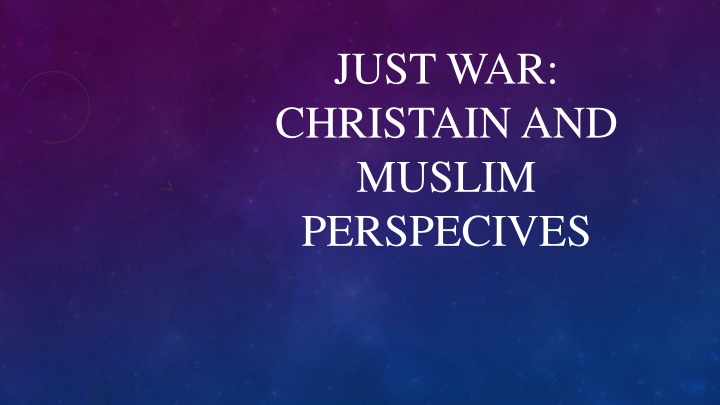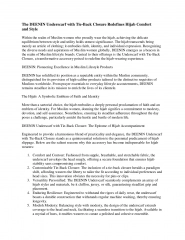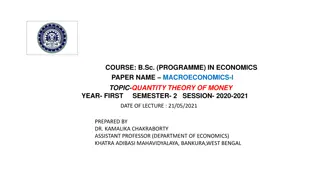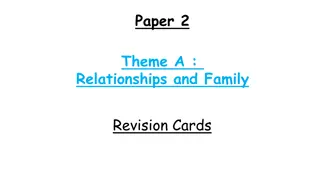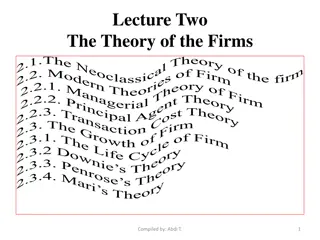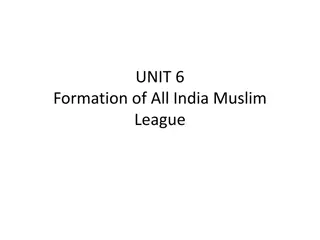Perspectives on Just War Theory from Christian and Muslim Standpoints
Just War Theory, rooted in Christian philosophy, aims to justify the use of force in specific circumstances to defend justice and protect human life. While pacifists reject all forms of war, adherents of the theory believe in certain criteria that must be met for a war to be considered just, such as legitimate authority, just cause, and right intention. This article explores the fundamental principles of Just War Theory and its application from Christian and Muslim perspectives.
Download Presentation

Please find below an Image/Link to download the presentation.
The content on the website is provided AS IS for your information and personal use only. It may not be sold, licensed, or shared on other websites without obtaining consent from the author.If you encounter any issues during the download, it is possible that the publisher has removed the file from their server.
You are allowed to download the files provided on this website for personal or commercial use, subject to the condition that they are used lawfully. All files are the property of their respective owners.
The content on the website is provided AS IS for your information and personal use only. It may not be sold, licensed, or shared on other websites without obtaining consent from the author.
E N D
Presentation Transcript
JUST WAR: CHRISTAIN AND MUSLIM PERSPECIVES
Introduction Introduction The just war theory is a largely Christian philosophy that attempts to reconcile three things: taking human life is seriously wrong states have a duty to defend their citizens, and defend justice protecting innocent human life and defending important moral values sometimes requires willingness to use force and violence The theory specifies conditions for judging if it is just to go to war, and conditions for how the war should be fought Pacifists declare that all war is evil and contrary to the principles of Jesus and the New Testament. Hence, Christian participation in war is forbidden.
Introduction Just war adherents believe that a war may be just if it meets certain criteria. If the war is just, then a Christian may participate in it. The purpose of this article is to summarize and defend the just war position. The aim of Just War Theory is to provide a guide to the right way for states to act in potential conflict situations. It only applies to states, and not to individuals (although an individual can use the theory to help them decide whether it is morally right to take part in a particular war).
1. 1. The War Is Conducted By Legitimate Civil Authority. The War Is Conducted By Legitimate Civil Authority. The authority to go to war resides in the state alone; no other institution or individual can commit a nation to war. Each nation needs to constitutionally designate who has the authority to define and formally declare war
2. 2. The War Is Based On A Just Cause. The War Is Based On A Just Cause. If the state is the minister of God for justice, then it can only wage war to uphold justice and avenge evil. Thus, a just war is one that is fought for the purpose of defending life and property, vindicating justice, and reestablishing peace. A just war is a response to evil; it is an act of defense against international criminal activity (as defined by God s law); it is a resistance to lawlessness and a terror to evildoers.
3. 3. The War Is Waged With The War Is Waged With Right Inte Right InteNTION. NTION. Not only must the cause be just, the just cause must be the reason why a nation goes to war. The intention must be justice and the restoration of peace and not national honor or development. Often, a just cause is just a cover for national or political ambitions. Augustine wisely pointed out that nations often go to war for no more than political and economic reasons. Political reasons include the desire for power, conquest, personal glory and national pride, and solutions to domestic problems. Economic reasons include the acquisition of new wealth, territory, natural resources, and access to trade routes and ports.
4. 4. The War Is Undertaken Only As A Last Resort. The War Is Undertaken Only As A Last Resort. All non-violent means and options for the redress of grievances and the establishment of justice between nations should seriously be tried and at an end before the use of deadly force can be justified. Althusius stated: Just cause for waging war occurs when all other remedies have first been exhausted and peace or justice cannot otherwise be obtained
5. 5. The War Is Fought On The Basis Of A Reasonable Chance Of The War Is Fought On The Basis Of A Reasonable Chance Of Success. Success. Before war is pursued there must be a careful calculation to determine if a nation has the strength and resources to win the war. If not, the commencement of military action should either be abandoned or postponed until the nation is ready. It is considered unjust to commit soldiers to die and to subject citizens to the depravations, sorrows, and horrors of war in a vain undertaking.
6. 6. The War Has The Establishment Of A Superior Peace As Its The War Has The Establishment Of A Superior Peace As Its Goal. Goal. This principle raises the issue of proportionality and states that war should not be waged unless the good that may reasonably be expected from taking up arms is greater than the evil to be redressed and the evils that may result from the conflict. To state it in another way, the peace that is sought through going to war must be preferable to the peace that would have prevailed if the war had not been fought. And again, the overall death and devastation anticipated by the war should be outweighed by the good that hopefully will result.
7. 7. The War Is Waged With Proper Discrimination Between The War Is Waged With Proper Discrimination Between Combatants And Non Combatants And Non- -combatants. combatants. This principle of just war states that civilians and civilian industry and property are not to be deliberately targeted nor abused, and that all due care should be taken to minimize collateral damage to civilian life and property. In other words, non-combatants are to be granted immunity from attack by the armies waging the war. Military personnel and military industry should be the sole objects of military operations.
Just War: Islam Perspectives Just War: Islam Perspectives Islam sets down clear guidelines as to when war is ethically right, and clear guidelines as to how such a war should be conducted. In brief, war is permitted: in self defence when other nations have attacked an Islamic state if another state is oppressing its own Muslims War should be conducted: 1. in a disciplined way 2. so as to avoid injuring non-combatants 3. with the minimum necessary force 4. without anger 5. with humane treatment towards prisoners of war Muslims must only wage war according to the principles of Allah's justice.
War in self defense Muslims must only wage war according to the principles of Allah's justice. Those who believe fight in the way of Allah, and those who disbelieve fight in the way of the Shaitan. Qur'an 4:76 Islam allows war in self-defence (Qur'an 22:39), to defend Islam (rather than to spread it), to protect those who have been removed from their homes by force because they are Muslims (Qur'an 22:40), and to protect the innocent who are being oppressed (Qur'an 4:75). But some Muslim thinkers in the past, and some more radical Muslim thinkers today, take a different view. They say that other verses in the Qur'an, the so-called 'sword verses', have "abrogated" (revoked or anulled) the verses that permit warfare only in defence. They used these 'sword verses' to justify war against unbelievers as a tool of spreading Islam (Qur'an 9:5, 9:29).
War In Self Defense Others take this further and regard non-Muslims, and Muslims who don't conform rigorously to the Islamic code, as non-believers and thus as "enemies of God" against whom it is legitimate to use violence. But the idea of a total and unrestricted conflict is completely unIslamic. But the idea of a total and unrestricted conflict is completely unIslamic. Fight in the cause of God against those who fight you, but do not transgress limits. God does not love transgressors. Qur'an 2:190 Islam is in favour of peace and against violence. Murdering the innocent leads to punishment in Hell: If anyone killed a person - unless it was for murder or for spreading mischief in the land - it would be as if he killed the whole people Qur'an 5:32
AIMS OF WAR The Qur'an emphasises that war should be fought only for noble motives without seeking any earthly reward: Those who readily fight in the cause of God are those who forsake this world in favor of the Hereafter. Whoever fights in the cause of God, then gets killed, or attains victory, we will surely grant him a great recompense. Qur'an 4:74
THE CONDUCT OF WAR Islam bans the killing of non-combatants (Qur'an 2:190, above), or of a combatant who has been captured. Muslims are forbidden from attacking wounded soldiers (unless the wounded person is still fighting). The Prophet's view of non-combatants is shown by a hadith in which Muhammad sees a woman killed in the battlefield and condemns the action. When an enemy is defeated he should be made prisoner rather than be killed: So when you meet in battle those who disbelieve, then smite the necks until when you have overcome them, then make (them) prisoners, and afterwards either set them free as a favor or let them ransom (themselves) until the war terminates. Qur'an 47:4 Abu Bakr (the First Caliph) gave these rules to an army he was sending to battle: Do not commit treachery or deviate from the right path. You must not mutilate dead bodies. Neither kill a child, nor a woman, nor an aged man. Bring no harm to the trees, nor burn them with fire, especially those which are fruitful. Slay not any of the enemy's flock, save for your food. You are likely to pass by people who have devoted their lives to monastic services; leave them alone (Abu Bakr)
